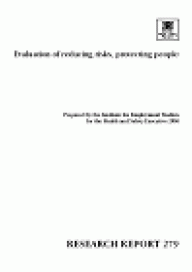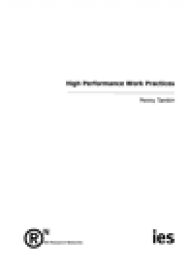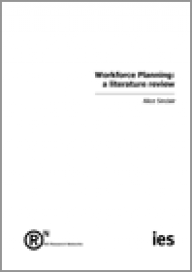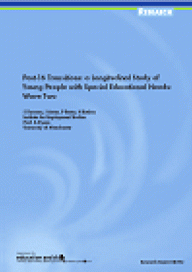Publications
 We author and publish a range of resources to keep you up to date with the latest developments in employment, labour market and human resource policy and practice.
We author and publish a range of resources to keep you up to date with the latest developments in employment, labour market and human resource policy and practice.
All our pdf publications are free to access.
-
📄
Building Coaching Capability
Carter A | Dec 2004 | Institute for Employment StudiesThis paper is a short guide for employers. It provides some ideas and help for those who are building coaching capability within their organisations, and those who anticipate doing so. It offers both a framework for employers to determine the best approach to building coaching capability, and case study examples of how First Choice Holidays, the BBC and Inland Revenue have gone about resourcing, deploying and developing their coaches.
-
📄
Researching the Independent Production Sector
A Focus on Minority Ethnic Led Companies
Pollard E, Barkworth R, Sheppard E, Tamkin P | Dec 2004 | Pact/UK Film CouncilThe film and TV industry has a poor record on diversity. There is low representation of minority groups, particularly those from minority ethnic backgrounds, in the workforce, and in content and portrayal. This is a preliminary study that gathers known literature, industry data, expert views and primary data (both quantitative and qualitative) on the independent production sector within both the film sector and the TV sector.
-
📄
A Stepping-Stone to Employment?
An Evaluation of the Permitted Work Rules - Wave 2
Dewson S, Davis S, Loukas G | Nov 2004 | Department for Work and PensionsIncapacity-related benefits provide people who have to stop working because of illness or disability with a measure of earnings replacement. Under the permitted work rules (introduced in April 2002), incapacity-related benefit claimants may work up to 16 hours per week and earn a set amount each week but for a limited period of time only (a maximum of 52 weeks). The research investigated the characteristics and experiences of the people who make use of the new rules; looked at who does and does not make use of the new permitted work rules; explored the extent to which the new rules provide a 'stepping stone' to employment for clients and explored the use of the new rules by Jobcentre Plus staff.
-
📄
Flexing your Remuneration
Variable Pay at Work
Suff P, Reilly P | Nov 2004 | Institute for Employment StudiesVariable pay, sometimes referred to as 'pay at risk', is the portion of the remuneration package that has to be earned on each occasion, usually by meeting and exceeding individual, team or organisational performance criteria. While the rewards from variable pay schemes can be substantial, employees are forced to shoulder more of the business risks - rewarding the 'upside' and penalising the 'downside' of performance.
-
📄
Current Thinking on Managing Attendance
a Short Guide for HR Professionals
Hayday S, Rick J, Patterson M, Turgoose C | Nov 2004 | National Audit OfficeThis publication is no longer available. This best practice guide by the Institute of Employment Studies and the Institute of Work Psychology summarised the thinking and related evidence on the efficacy of various approaches to managing attendance from academic and practitioner literature from the early 2000s.
-

Evaluation of Reducing Risks, Protecting People
Rick J | Oct 2004 | Health and Safety ExecutiveReducing Risks, Protecting People (R2P2) is the document that explains the basis for the Health and Safety Executive's (HSE's) decision-making processes. As such it underpins all HSE regulatory activity. The research summarised here sought to establish the reach of the document amongst the HSE's stakeholder groups and to determine the extent to which R2P2 makes HSE activities transparent and lays the decision making process open to scrutiny.
-

High Performance Work Practices
Tamkin P | Sep 2004 | Institute for Employment StudiesThe question of whether the way people are managed and treated at work contributes to the overall performance of the enterprise has been much debated. The focus of this debate has tended to be on formal processes and procedures within organisations. These high performance working practices (HPWPs) have been the subject of a wide range of studies designed to test their impact.
-

Workforce Planning: A Literature Review
Sinclair A | Sep 2004 | Institute for Employment StudiesWorkforce planning has been around for a number of years but there has been a resurgence of interest in this HR practice as organisations have begun to realise that the need for planning is greater than ever.
-
📄
Managers as Developers of Others - A Practical Framework for Managers
Hirsh W, Silverman M, Tamkin P, Jackson C | Sep 2004 | Institute for Employment StudiesThis paper outlines how managers can improve their effectiveness in developing others, and covers setting the climate, building a developmental relationship, feedback and focus, delivering development and active career development. It also demonstrates how these elements relate to each other. The paper outlines what managers should not do when developing others.
-

Post-16 Transitions: a Longitudinal Study of Young People with Special Educational Needs (Wave Two)
Dewson S, Aston J, Bates P, Ritchie H, Dyson Prof. A | Sep 2004 | Department for Education and SkillsThis second wave of longitudinal research with young people with special educational needs (SEN) records and tracks their progress as they moved from compulsory schooling to early adulthood. This study reports the experiences of young people two years after they completed statutory schooling.
